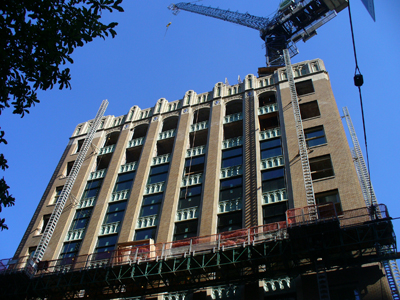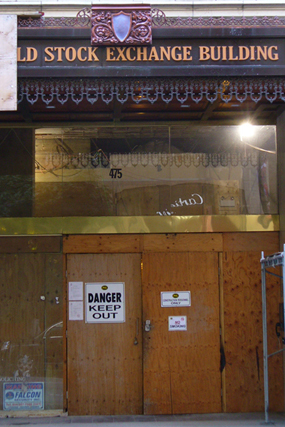
Reflections on Vancouver, British Columbia and other topics, related or not
The VSE reborn
Juniors, brokers, promoters desert Toronto
to revive the Vancouver Stock Exchange
Greg Klein | April 1, 2016
Will the Vancouver Stock Exchange restore this city’s faded lustre?
Hedley Beauford’s not a man to mince words. And he speaks for many others. “The TSX Venture Exchange isn’t just broken,” he declares. “It’s unfixable. It’s time to go back to our roots and start all over again.”
We’re seated in Beauford’s office, newly remodelled but with walls displaying reminders of the past. Beauford proudly points to stock certificates from long-forgotten companies, portraits of colourful Howe Street characters, photos of frenzied trading floor activity and other mementoes of the former Vancouver Stock Exchange that was housed in this very building. As tradespeople and new staff bustle about with last-minute preparations, Beauford explains why he’s re-opening the fabled bourse.
Built just in time for the 1929 crash, the Vancouver
Stock Exchange building gets a 21st-century retrofit.
It was here that deals were done and money was raised for some of mining’s greatest events, he says. Pyramid, Dynasty, Eskay, Stikine, Afton, Gibraltar, Hemlo, Ekati, Voisey’s, Diavik—the names speak of grit, determination and above all success. It was here that great companies and great discoveries were made possible and here that venture capital will restore itself, Beauford maintains.
Only in Vancouver can the sector correct the catastrophe that began with the VSE’s 1999 merger into a Calgary-based exchange, and the devastation that continued as mining juniors found themselves shunted onto the TSXV. Along the way came a punishing regimen of rules and regulations that nearly killed Canadian venture capitalism, Beauford contends.
That regimen hasn’t done much for Toronto either. Both the TSX and TSXV experience an ongoing decline in listings, financings and total market cap. The Venture in particular has been walloped in trading volume and value. The TMX Group’s own stock (TSX:X) spent most of 2016 trading at five-year lows. Attempts to revitalize the Venture from within, meanwhile, have provoked outright scorn from critics who see no end to excessive fees and regulations.
There have been glimmers of hope elsewhere. Revamped by Ned Goodman, the Canadian Securities Exchange reported record volume last year along with a 20% increase in listings. Last week newcomer Aequitas Neo marked its first year of operation. But even these efforts face impending doom through over-regulation, Beauford argues. The only solution he sees is a return to the VSE, once considered the greatest venture capital market in the world.
Yet the VSE had another reputation too—the scam capital of the world. But say that to Beauford and you’ll experience his 120-decibel, nine-Richter-scale apoplectic rage.
“Outrageous!” he bellows, veins throbbing on his forehead. “Vicious exaggeration! Anyone who’d call Vancouver the scam capital of the world doesn’t know the scam capitals of the world like I know the scam capitals of the world.”
BCSC officials “had no right to put up
that stupid sign,” Beauford insists.
Still that rep, whether overstated or not, dates back to a time when the VSE faced little if any oversight. Now critics say the pendulum has swung to the opposite extreme. According to their argument, re-opening the VSE would solve nothing if the sector continues to be stymied by the Investment Industry Regulatory Organization of Canada and the British Columbia Securities Commission.
Or, as Beauford prefers to call them, “those capital-depleting, blood-sucking, anal-retentive power-trippers.”
But his countenance relaxes as he explains that IIROC and the BCSC will have no jurisdiction here. For that, Beauford credits a very Canadian turn of events.
“Anyone who’s followed Vancouver real estate these past years knew it was only a matter of time before Chinese state-owned companies got involved. That’s finally played out to its logical conclusion. Vancouver now comes under Chinese sovereignty. Beijing will make its official proclamation next week to coincide with Canada’s next formal apology. We anticipate excellent relations with our new oversight agencies—if there are any.”
Freed from those shackles, he looks forward to reliving “the excitement that comes when you send a stock soaring to the heavens with no logical means of support. Then, just before the punters catch on, the delight in crashing it to earth. To me, that’s venture capitalism. And no place can revive it like Vancouver.”
But no matter how laissez-faire, a market can’t overcome lousy commodity prices. Doesn’t Beauford have other concerns besides over-regulation?
“Oh, we won’t be limited to resource stocks,” he answers. “That brings to mind what I’ve always thought of as a conflict of interest in Toronto, where the TMX Group trades its own stock on its own exchange. So once Vancouver’s officially separated from Canada, the VSE will be the perfect venue for a fairly big up-and-coming listing.
“For years Canada’s been pleading with the world to buy us, buy our land, buy our companies, buy our resources,” he continues. “Soon foreigners will be able to buy our country share by share, and this time even Canadians can participate. We expect Canada Corp to make its VSE trading debut exactly 12 months from today, when the country begins its next fiscal year on April 1, 2017.”


